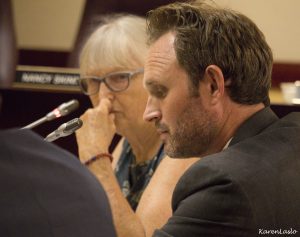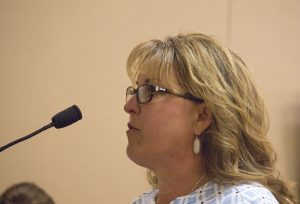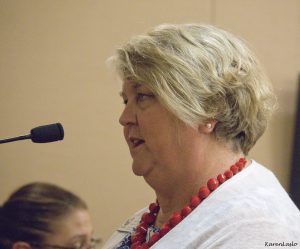by Leslie Layton and Karen Laslo
Chico-area residents and Butte County leaders spoke at last week’s Senate committee hearing in Sacramento, some in support and some in opposition to Assemblyman James Gallagher’s Camp Fire housing bill that will encourage large-scale development.

Gallagher’s bill, AB 430, was passed July 3 on a 5-1 vote by the Senate’s Environmental Quality Committee and will be the subject of a final committee hearing on July 10. The bill will facilitate housing construction in eight communities by letting builders, in many cases, circumvent review under the California Environmental Quality Act (CEQA) and by reducing requirements for public hearings for new development.
The Chico City Council voted in May to be removed from AB 430, titled the “Camp Fire Housing Assistance Act of 2019,” and introduced by Gallagher (R-Yuba City). AB 430 would be applied to the cities of Biggs, Corning, Gridley, Live Oak, Orland, Oroville, Willows and Yuba City. To what extent the legislation would meet the needs of Camp Fire survivors is unclear; there is no provision in the bill for affordable housing, which is what drew many Paradise residents to that town.

In the Chico Enterprise-Record “Pro vs. Con” column that features guest commentaries, Gallagher wrote, “The vacancy rates in Chico and the surrounding communities are zero.”
His bill, he said, would “fast-track residential housing projects that local governments have already planned for and otherwise pose no significant issues. It does this by bypassing the greatest impediment to housing in this state: the California Environmental Quality Act (CEQA).”
But many argue that CEQA is not at the root of the housing crisis in California or in the Northern Sacramento Valley. An analysis conducted for the Senate says that fewer than 1 percent of the projects under CEQA review become the object of litigation.
Richard Harriman, a local attorney who serves as general counsel to the Northern California Environmental Defense Center, spoke against the bill in Sacramento last week and has blasted it as a “trojan horse” and a “gift to large-scale developers.”
“There’s nothing in the bill that says that housing has to be affordable,” Harriman told ChicoSol today, adding that it doesn’t guarantee housing for Paradise evacuees or protect their access. “It’s a blank check to large developers from Sacramento and elsewhere to build large-scale subdivisions in the south central Sacramento Valley.”
At the final committee hearing on July 10, Harriman said he will ask the Senate’s Government and Finance Committee to amend the bill to provide financing for electric buses. Many of the people who would buy the new homes would be commuting to job centers in Chico and Sacramento, and the bill doesn’t address the costs of “cumulative impacts,” such as increased traffic on Highway 99, he added.
The Senate committee that just approved the bill oversaw an analysis by consultant Genevieve Wong, who seemed startled by many features and recommended revision. She notes that a low-density housing project could be as large as 50 acres under AB 430, streamlining the planning process in communities where there are few fire evacuees. (To see Wong’s analysis, click here and then download the report from the link “Senate Environmental Quality.”)
(Higher-density projects tend to lower housing prices.)
She asks how cities will know, with so little review, whether the projects “expose people or structures to significant risks” and what the effects of population growth will have on emergency evacuation routes.

In a July 1 letter to the Senate Environmental Quality Committee, the Sacramento-based Planning and Conservation League (PCL) said it wanted to convey “strong opposition” to Gallagher’s bill. “It should be noted that a CEQA exemption already exists for the rebuilding of properties lost due to fire,” the letter notes.
The letter points out that in 2018, PCL, which calls itself an “author and guardian of CEQA,” worked with the city of Santa Rosa and Sonoma County to pass a bill that would streamline housing development in a thoughtful manner.
But Gallagher’s bill had the support of Chico’s business community as well as a dissenting city councilor during the committee hearing last week.


Leslie Layton is editor of ChicoSol and Karen Laslo is a contributing photographer and reporter.

Thanks for a fair report of the pros and cons, though there are many other considerations:
1. This sets a bad precedent for CEQA, which could now be weakened (or”streamlined” with any future disaster.
2. Cumulative impacts: big development will still impact Chico and the environment unless, as Richard Harriman states in an amendment, electric buses are provided and mandated for the travel from outlying communities to work centers like Chico and Sacramento.
We really only have 11 years to aggressively address climate change , and we absolutely need to take it seriously. AB 430 is a recipe for exascerbated carbon emissions and increased climate change, bringing with it more apocalyptic fires like the Camp Fire.
Bless our tireless, learned environmental cadres trying so hard to save our behinds!!!
Rep. Gallagher’s AB 430 is a cynical bill. It is not about providing housing for those in need but about providing developers and small town leaders with opportunities to make money. This bill will not provide the type of housing (affordable) needed by most residents, and there are plenty of houses in the pipeline already for middle income residents.
Most important, this AB 430 exempts builders from CEQA, gutting the environmental protections we need, just when we need them most.